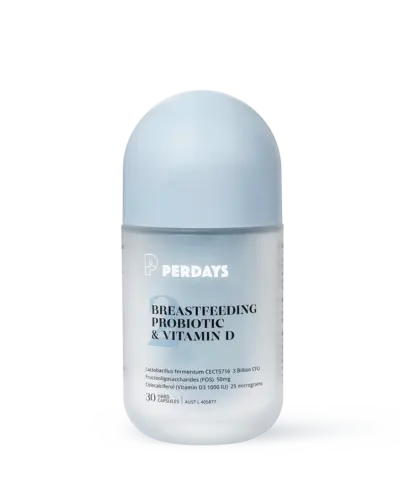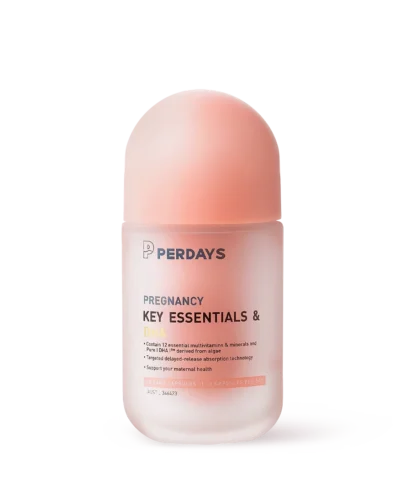Contents
- Vitamins During Breastfeeding: Your Postnatal Guide
- Can You Take Standard “Hair, Skin, and Nails” Products While Breastfeeding?
- How Much Vitamin C is Safe While Breastfeeding?
- Can Breastfeeding Cause Vitamin Deficiency in the Mother?
- Is Vitamin E Safe for Breastfeeding?
- Can I Take Vitamin B12 While Breastfeeding?
- Can I Take Vitamin D and Calcium While Breastfeeding?
- How Long Should I Take Postnatal Vitamins?
The Essentials
- Breastfeeding mothers should focus on a nutritious diet to meet their and their baby’s needs.
- Consult a healthcare professional before taking any supplements or beauty products while breastfeeding.
- Adequate intake of vitamin C through a diet rich in fruits and vegetables is important for immune function during breastfeeding.
- A well-balanced diet can usually meet the increased nutrient requirements of breastfeeding mothers, but deficiencies can be identified and corrected through consultation with a healthcare professional.
- Vitamin E, vitamin B12, calcium, and vitamin D are important nutrients for breastfeeding mothers, and supplementation may be necessary depending on individual needs. Consult a healthcare professional for personalised advice about postnatal vitamins.
About Breastfeeding
Congratulations on the safe arrival of your new bub! If you are breastfeeding, you will want to ensure you are meeting the nutritional needs required to support you and your baby during this crucial phase of development. Distilling fact from fiction on this topic can be a time-consuming minefield and let’s face it, you’re tired! Most mothers want to know which vitamins are beneficial and most importantly, safe to take while breastfeeding. In this article, we answer common questions about supplement use during the postnatal period and breastfeeding, including vitamin C, calcium, vitamin D, vitamin E and B12.
Can You Take Standard “Hair, Skin, and Nails” Products While Breastfeeding?
Most women are eager to regain their healthy hair, glowing skin and strong nails after the birth of their baby. Products promoting healthy hair, skin, and nails are readily available and suitable for general use but may contain ingredients unsuitable for pregnant or breastfeeding women. Therefore, before taking any postnatal vitamins or supplements, it’s important to check that the ingredients and the quantity of each are safe for use during breastfeeding. Many products can be transferred through breast milk so it’s best to consult your healthcare professional before use.
How Much Vitamin C is Safe While Breastfeeding?
Vitamin C, also known as ascorbic acid, plays a crucial role in immune system function. Vitamin C is water soluble and easily excreted by the body, so risks associated with higher doses are minimal. However, vitamin C cannot be stored in the body so regular dietary intake is essential. A diet rich in fresh fruit and vegetables should supply the basic vitamin C requirements of 120 mg per day for breastfeeding women according to the National Institutes of Health (NIH). As well as supporting your baby’s development, vitamin C may help to resolve mastitis infections. Mastitis is a disease that occurs when a milk duct is blocked and does not clear out on its own. Staphylococcus aureus causes the most chronic type of mastitis, and there have been studies that show that vitamin C (at doses 3000-5000 mg daily) limits Staphylococcus aureus, therefore working against mastitis. If you are concerned that you are not meeting your vitamin C requirements during breastfeeding, consider a high quality prenatal daily supplement.
Can Breastfeeding Cause Vitamin Deficiency in the Mother?
A mother’s nutrient requirements increase for the duration she breastfeeds her infant. However, a diet rich in fresh vegetables, unprocessed meat, whole grains, healthy fats, nuts and fruit, will help to meet these increased demands. A comprehensive blood test and subsequent consultation with a healthcare professional will help identify any deficiencies. Fortunately, solutions are easy to access and implement in order to correct any imbalances, ensuring that the needs of mother and baby are met.
Is Vitamin E Safe for Breastfeeding?
Vitamin E is a powerful fat soluble antioxidant which protects cells from damage and is readily found in breast milk especially colostrum. Supply of vitamin E to the infant is dependent on the mother’s dietary intake. During breastfeeding, 100 IU daily of natural vitamin E is recommended. While the majority of women can get what they need through foods such as avocado, sunflower seeds, whole grains, wheat germ oil etc, supplementation is also a safe option. One study found that a 100 IU/day dose of vitamin E combined with 500 mg/day of vitamin C improved the antioxidant capacity of breast milk indirectly.[1]
Can I Take Vitamin B12 While Breastfeeding?
Healthy neurological functionality and the creation of red blood cells depend on adequate levels of vitamin B12. The National Institutes of Health (NIH) recommends 2.8 micrograms (mcg) of vitamin B12 per day for lactating women. The majority of women may fulfil this need by eating a diet that is well-balanced and includes animal products including meat, fish, eggs, and dairy. However, mums who follow a vegetarian or vegan diet may be more susceptible to deficiencies and should consider taking a B12 supplement. As usual, consult your healthcare professional to determine your needs.
Can I Take Vitamin D and Calcium While Breastfeeding?
Calcium and vitamin D are vital for healthy bones, teeth, muscles, nervous system and immune function. These nutrients are critical for you and your growing infant. The National Institutes of Health (NIH) advise nursing mothers to consume 600 IU of vitamin D and 1000 mg of calcium daily. Many breastfeeding women could require postnatal vitamins and supplements, particularly if their meals are lacking in these nutrients or if they don’t receive sufficient direct sun exposure.
With direct exposure to skin, the body will produce its own vitamin D but depending on your lifestyle and where you live, it may not be achievable. (Note: the use of sunscreen will block the body’s ability to make vitamin D!)
Dairy products, leafy greens, fortified foods and tahini are good sources of calcium, but again, if your diet is an unreliable source then supplementation may be a convenient solution. Consult your healthcare professional for the right products and doses to suit your needs.
How Long Should I Take Postnatal Vitamins?
The purpose of postnatal supplementation is to help replenish any nutrient deficits caused by 9 months of pregnancy, and also supply nourishment (postpartum) to a rapidly growing infant! The duration of your postpartum supplement use will depend on your needs and that of your baby. Essential nutrients that are commonly low in breastfeeding mothers include DHA, folate, choline, iodine, selenium, calcium, vitamin D, zinc and vitamin B12, to name a few.
It’s important to remember every woman has her own biological makeup, lifestyle and needs, so try to avoid a one-size-fits-all approach. Instead, customise the dietary changes and supplementation so that you can stick to it! At Perdays strongly advocate consulting a qualified healthcare practitioner before changing or starting your supplement regime.
Support you and your baby while breastfeeding
Perdays Breastfeeding Probiotic & Vitamin D has been formulated to support infant growth and development during breastfeeding and can help reduce occurrence of symptoms of mild mastitis. Each capsule Lactobacillus fermentum CECT5716 3 billion CFU, Fructooligosaccharides 50mg, and Colecalciferol (Vitamin D3 1000 IU) 25mcg
Looking For a Pregnancy Multivitamin with DHA?
Perdays Pregnancy Key Essentials & DHA Perdays is designed to work synergistically to support your preconception and prenatal health, thanks to our patented Nutriseal™ encapsulation technology. This pregnancy multivitamin contains a precise combination of 12 essential prenatal vitamins & minerals with algae-derived DHA and Folinic Acid to be absorbed by all women.
References
- [1] https://pubmed.ncbi.nlm.nih.gov/25915716/
- https://www.drugs.com/mtm/hair-skin-nails.html
- https://www.ncbi.nlm.nih.gov/books/NBK544628/#:~:text=The%20recommended%20vitamin%20C%20intake,a%20reason%20to%20discontinue%20breastfeeding
- https://internationalbreastfeedingjournal.biomedcentral.com/articles/10.1186/s13006-017-0105-1
- https://www.ncbi.nlm.nih.gov/books/NBK500951/
- https://www.ncbi.nlm.nih.gov/books/NBK534419/#:~:text=Summary%20of%20Use%20during%20Lactation,mcg%20per%20day%20during%20lactation
- https://americanpregnancy.org/healthy-pregnancy/breastfeeding/postnatal-vitamins-while-breastfeeding/




What combination of supplements would you recommend for breastfeeding mum of twins?
Hi Doreen. Thanks for reaching out to us and sorry for the delay in getting back to you. Congratulations on the arrival of your twins 🙂
Many of the nutrients in high demand during pregnancy are depleted in women postpartum. Our prenatal formula (Pregnancy Key Essentials & DHA) is also suitable for postpartum needs and will support general health and energy levels while you are looking after your babies!
We also have two different probiotic products, that would be suitable for you.
Probiotic 360 & Vitamin D is a reformulation of our best-selling product – it is a precisely formulated probiotic that contains evidence-based probiotic strains suited for pregnancy and into the post-partum period. It’s a great all-round formula which contains key probiotic strains to support maternal health, healthy vaginal flora, healthy bowel function, friendly gut flora after antibiotic use and immune system health.
Our second probiotic product is called Breastfeeding Probiotic & Vitamin D. This one is a more targeted formula, containing an evidence-based probiotic strain that helps to reduce symptoms of mild mastitis while breastfeeding. It also helps to restore friendly gut flora and support immune system health in breastfed infants.
Both products contain 1,000 IU vitamin D per daily serve, which is an added bonus for you and your twins. Research shows that the amount of vitamin D in breastmilk is directly related to the amount of vitamin D that the mother gets – from food, sunlight, and supplements. Studies have also found that maternal supplementation of vitamin D increases infant vitamin D levels (in a breastfed babies). Maternal intake between 4,000-6,400 IU per day has shown to be adequate. So if you decide you want to take both probiotic products (which you definitely can), you will achieve 2,000 IU per day from this alone.
The postpartum period can be a real drain on the Mother’s body (especially if you are breastfeeding). So make sure you are looking after yourself with nourishing foods, LOTS and lots and lots of water and rest (whenever you get the chance!). I would also recommend discussing your postnatal nutrient status with your healthcare practitioner at your next check-up. Some women may benefit from additional iron after giving birth (depending on how much blood loss occurred during labour – if at all). Or you may find you need to focus on something else (nutrient-wise).
I really hope this helps to answer your question.
Remember to take care of yourself during this special and exciting, yet challenging time. Believe me when I say it goes by far too quickly (even though it doesn’t feel like it, in the moment)!
Kind regards,
Larissa Mathies